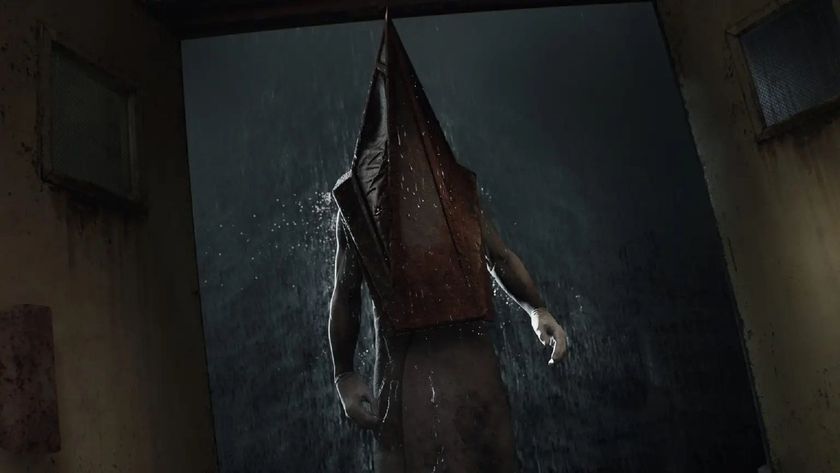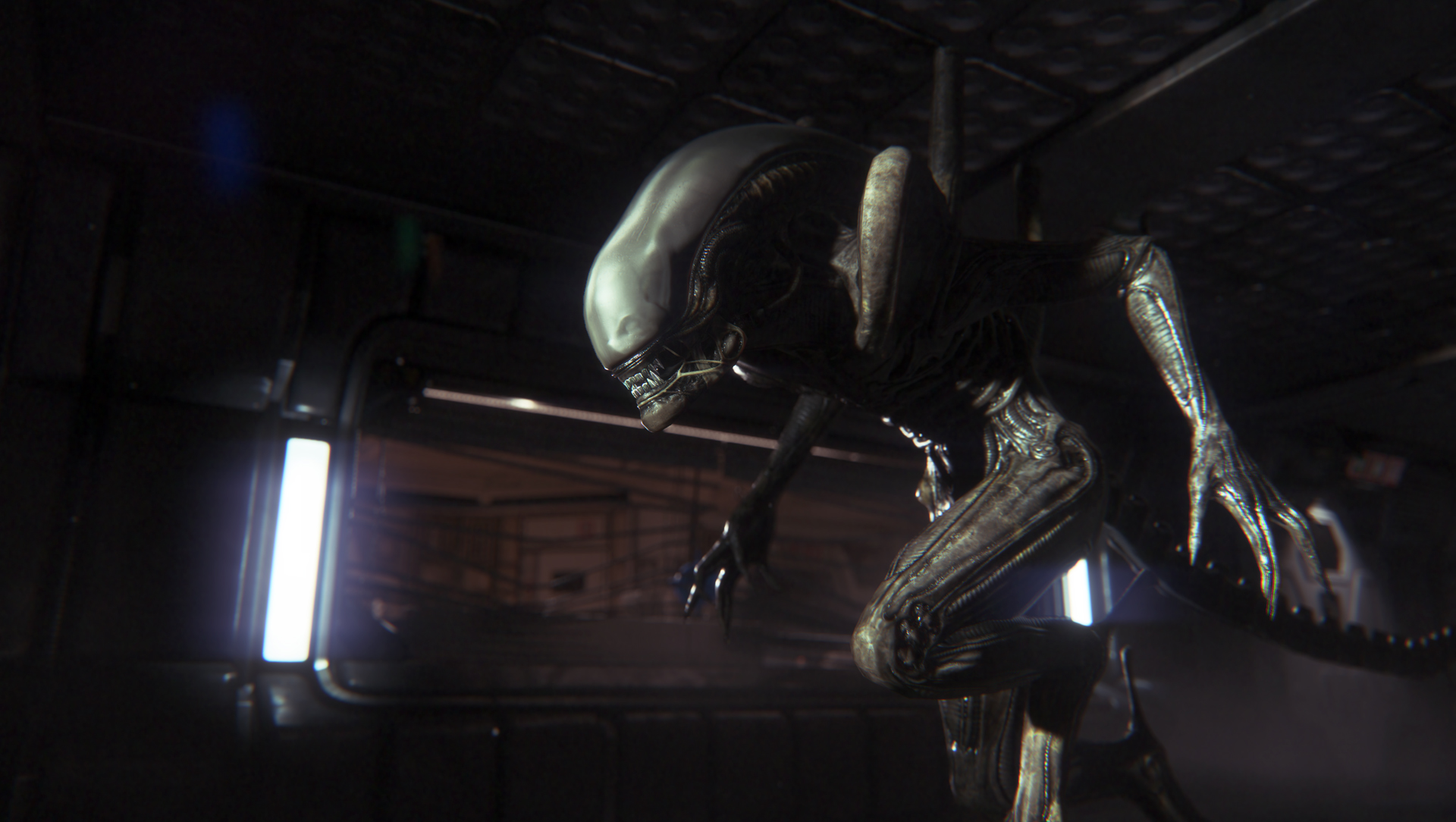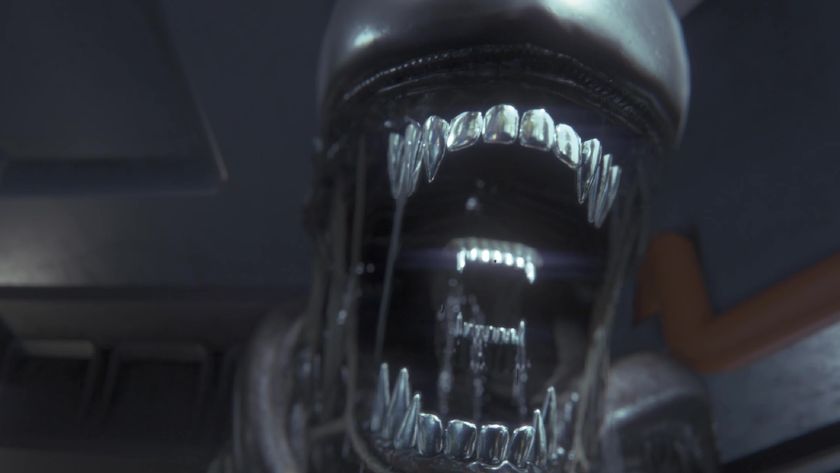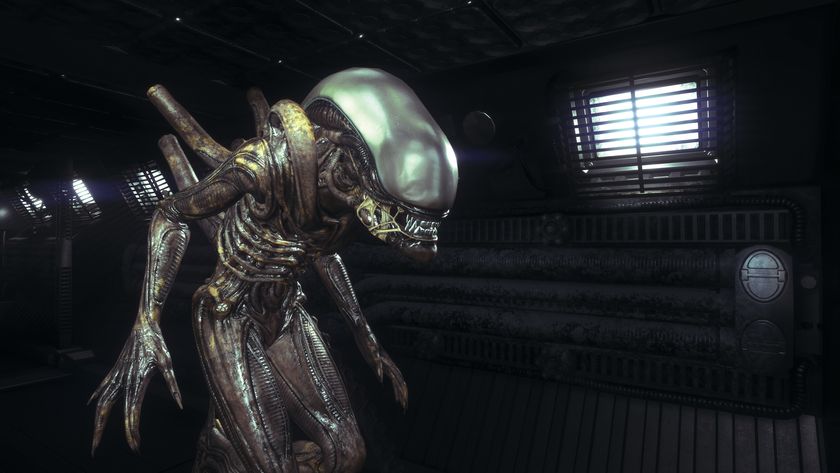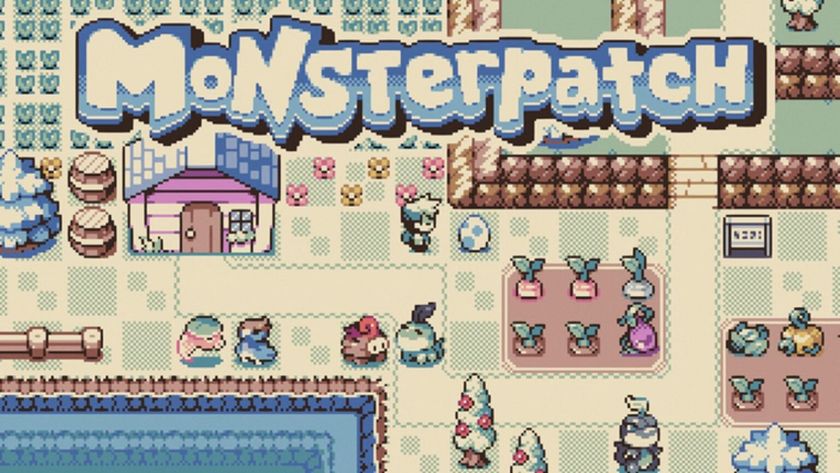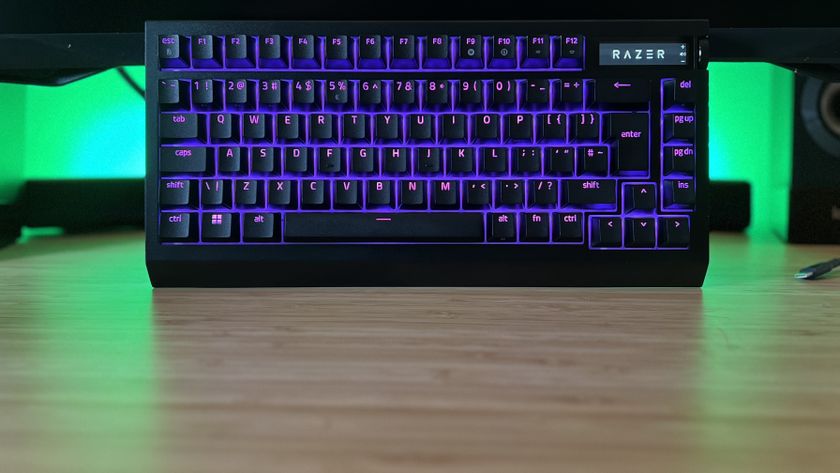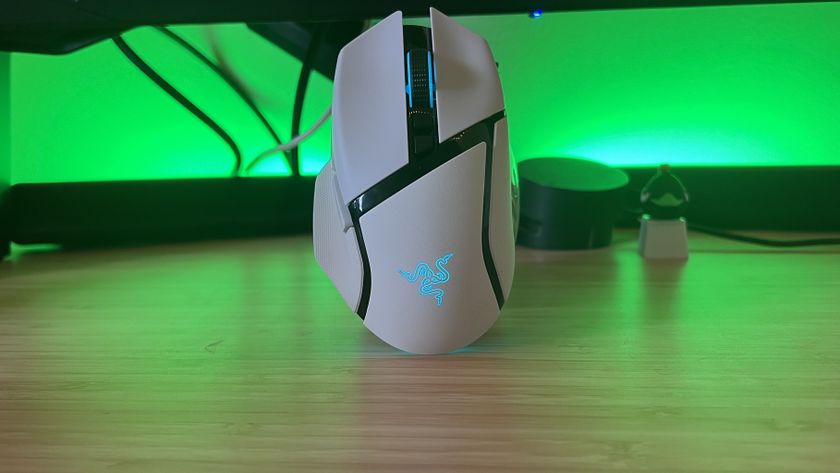12DOVE Verdict
Deep, intelligent, intense, and utterly unlike any experience before it, Alien: Isolation presents all that's truly great about AAA, and also its evolution.
Pros
- +
The Alien is truly terrifying
- +
Amazing recreation of the Alien universe
- +
Smart AI keeps the game unpredictable
- +
Looks astonishing
- +
It's a long game
- +
but intense throughout
Cons
- -
Lack of guidance will deter some
Video games are liars, and you are a fraud. I’m sorry if that sounds harsh, but it’s best that you know this right now. I once thought as you do now. I thought I had achieved things. I thought I had overcome adversity and performed heroic, death-defying feats. But I know now that those adventures were a sham, a theme park version of danger and peril, my heroism puppeteered on invisible strings and my path to victory pre-paved. Because now I’ve experienced Alien: Isolation.
The Alien doesn’t give a fuck about how many of video games’ stupid lies you’ve believed. It couldn’t care less about your naïve, assumed privileges as Designated Protagonist. And if it had anything resembling relatable human emotions, it would laugh in the face of what you think you know about stealth and survival. I’ll let you into a little secret about Alien: Isolation. It isn’t a survival game at all. It’s a survival simulator. That’s very, very different to anything you’ve encountered before. Forget what you think you know. It won’t help here.
If Alien: Isolation can be summed up with any one word, then it’s ‘real’. Not ‘realistic’. Not ‘visually believable’. Not even ‘immersive’, that peak achievement of the best AAA games thus far. But flat-out, bona fide real, right through to its core, throughout everything it does.
Discovered in the death throes of a physical, social and economic collapse, Sevastapol station (resting place of the ill-fated Nostromo’s black box recorder) is a truly living ecosystem. And within it, you--even as Amanda Ripley, daughter of Ellen--are not special, protagonist’s rights be damned. Very quickly, that notion will be driven into you as hard as a sledgehammer shot. Every one of Sevastapol’s humanoid denizens--from aggressively defensive looter to low-fi, bargain-bin android--is driven solely by the same dynamic, emergent AI instincts that have given the titular beast itself such warranted attention. Every encounter brings immense depth and spiralling, potentially deadly possibilities. Your enemies’ behaviour is always logical but endlessly unpredictable, driven by emergent interplay between character, environment and circumstance.
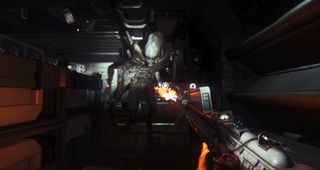

Many licensed games use art and sound assets from the original source, but most, at best, do a good impersonation. Alien: Isolation feels like Alien. Clean lines and dirty surfaces. Brutal, utilitarian spaces and gently dancing light. The interplay between abrasive, ambiguous noise, weighted, underplayed dialogue, and thick, nervous silence. That atmosphere. Plenty of games, officially or not, try to steal the look of Alien, but only Isolation has ever captured its soul.
And you are not ready. Alien: Isolation’s stealth survival bears very little resemblance to what the genre has previously taught you. There are no set patrol patterns here, no easily identifiable, black-and-white states of alertness to be read and manipulated all the way to victory. This is a survival simulation. These are real, thinking, reacting threats, with their own agendas driven by anger, fear, stress, and steadfast self-preservation. They won’t give you any convenient windows of safety or any second chances. They’ll make you improvise every opportunity, however slim.
If this sounds potentially frustrating, don’t worry. Isolation deftly avoids that issue at every turn. While Isolation’s objectives are mostly linear, its environments’ intricate, branching paths provide a vast array of fresh, rewarding, creative approaches to navigation and evasion. Enemies will make full use of that as well, demanding complete awareness of every evolving situation. But combined, all of his turns Isolation’s stealth into a deeply satisfying, free-form sandbox, utterly devoid of the prescriptive play that often plagues the genre.

Manual save-points initially appear a harsh addition, but rapidly become a strategically exciting double-edged sword. Like Dark Souls’ bonfires, they present both the upset of the painfully-far-away (though in truth they never are) and joyful, victorious achievement upon reaching them. There’s also an electrifying risk/reward game. Do you plough on after a midpoint objective, or make a risky but potentially beneficial backtrack to safety? At first seeming a blunt, additional hardship, they actually amplify the tactical excitement of evasion and build a greater relationship with your environment. And that really matters, because you’re going to need every advantage you can muster.
Get caught in the open by a looter, and if you don’t back off quickly then there’s every chance you’ll be immediately face-down with a single bullet in your skull. And that’s if they even give you a warning. It’ll depend entirely on their mood. And that will depend on their previous emotional states, which in turn will depend on whatever dynamic events they were dealing with before you stumbled in. It’s chaos theory in practice, the shape of each encounter formed well before it begins, and playing out through nothing more than gloriously freeform, exhilaratingly unpredictable, skin-of-the-teeth desperation.

You must truly live in the moment, making the second-to-second best of an unremittingly bad situation. You have lockers to hide in, vents to scurry through, and an ever-expanding array of bodged-together flash-bangs, noise-makers, smoke bombs and Molotovs. Even a couple of hard-to-use guns, later on. But none of them is ever the true answer. Because there are no true answers. Every possibility comes with disadvantages. Most are unwieldy and uncertain in their results, and all have the potential to make things worse if they don’t pan out. And they often won’t. Every move you make has an immediate and dramatic effect. Everything’s a ripple in the pond, and nothing ever reverts to a reassuring ‘normal’. It's all monumentally unsettling, made of constantly threatening unknowns. Exactly as real horror should be.
It takes at least a couple of hours to deprogram those long-ingrained video game instincts and understand how things work here, but when you do, you’re in for the most tooth-crackingly tense, ferociously believable, and emotionally harrowing survival action you’ve ever experienced. Not to mention a constant array of spectacular, randomly evolving, dramatic set-pieces, the power and spontaneity of which can put even the best scripted action to shame. You might gingerly open the door to a cavernous room that you know is filled with gun-toting humans, only to instantly behold they and the Alien silhouetted in a grim tableau of evisceration. You might quickly sneak out of a dangerous corridor to a side-office, to calm down and regroup, and immediately see a nine-foot horror show walking past the opposite door, missing you by a second.

Oh yes. The Alien. There’s that as well. Once you’ve spent the first hour or two forcibly acclimatising yourself to the depth, pace, and sheer, relentless demands on your mind and nerves, the real terror arrives. And you are not ready.
So nuanced, layered, and complete is the experience laid out by all of the above, that it’s almost possible to forget about the beast before it eventually appears. But however aware of it you are, its impact is devastating. Hell. I’d encountered it multiple times at preview, and even now, after the marathon, masterfully-paced running time of the full game (at least 20 hours, based on the current office completion average), it’s still a terrifying, confounding, and captivating presence.
I use ‘captivating’ very deliberately there. Because the Alien is not simply a figure of fear. Its advanced intelligence and senses make it death-on-legs, a truly living, untamable wild animal. If it sees you, you are almost certainly dead. If it’s closely stalking you, your personal view of the world changes in an instant. Instinctively, you suddenly define your surroundings by light and shadow, by hiding holes, cover, silence and sound, all of which can work for or against you. Progress becomes a case of ‘if’ and ‘how’, not ‘when’. Movement is measured in inches and feet rather than metres, and simply remaining alive becomes more exhilarating than any objective achieved. Every new hiding place reached becomes a glorious win. Every room crossed becomes more satisfying than any boss fight. It’s as thrilling as it is terrifying, and that’s to say, immensely.
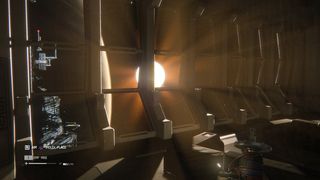
But over time, your relationship with the Alien will change, just as it changes the dynamics of the world around you. Despite its horrific, primal nature, you’ll steadily form a closeness to it. A strange, terrified, adversarial intimacy as you unconsciously study it and learn. Its sheer array of behaviours, reactions and abilities, while always monstrously imposing, will start to inform your own. The sound of its footsteps when out of sight, the cacophony of its breathing and screams, and the metallic thunder of its traversal through vents, gradually become a language, and your deadly, cat-and-mouse interplay a conversation. Avoiding, misdirecting and outsmarting a dangerous enemy is always a satisfying action, but with so much emotional weight attached to the act, and your methods informed by so much unguided, hard-earned understanding of the organism’s nature and actions, it’s more powerful and personal here than you’ve likely experienced before.
You’ll start to plot its invisible routes ‘outside’ of the level. Its movements on your motion tracker will explain its paths and behaviours around the map if interpreted with insight. You’ll try to predict whether it’s on the ground or in the ceiling, based on the sounds it makes. Eventually, it will become a key part of your journey, a perverse companion even. Sometimes you’ll even look upon it with fleeting relief, as it arrives to gore a pack of noisy, bloodthirsty looters on your tail. As later items allow you to interact with it more directly--though never to truly fight back--that closeness will increase, until by the end you’ll find your journey to be as strangely emotional as it is physical. In fact you’ll go through a very similar personal development to that of one Ellen Ripley over the course of a certain three films. And there truly can’t be a more perfect adaptation of Alien than that.
Stay low. Stay quiet
Survival is everything in Alien: Isolation. And it's not easy. Not easy at all. Fortunately, I've spent enough time on Sevastopol's uncaring, tin-can Hell to know how it works, and I can offer you a few rudimentary pointers. You're still in trouble though. A lot of trouble. You have my sympathies.
Know where your save point is
Upon entering a new area, it should be the first thing you find. Think about doubling back to it between objectives (if it's worth the risk), and don't worry too much about hostiles near it, as long as they're not in the way. It you survive long enough to make the save, they'll have moved on when you reload.
Choose (and use) your distractions wisely
Every crafted lure, trap and weapon can be as damaging to you as your pursuers. Flash-bangs and EMPs draw a lot of attention. Noise-makers can bounce the wrong way, attracting rather than distracting. Molotovs will get everyone's notice, and can burn you up just as easily as your opposition. Guns are loud, slow, awkward to use, and desperately inaccurate at range. Be very, very careful with all of your tools.
Fear the synthetic
I can't prepare you for how utterly chilling Sevastapol's android drones are, but I can help you deal with them. They're incredibly resilient to violence, but a flash-bang--or even better, EMP--will stun them long enough to bludgeon. That though, will take time, causing a lot of noise and exposure in the process. Think very cautiously.
And really, on a fundamental level, that’s what Alien: Isolation is about. It isn’t interested in giving you a sanitized, sugar-coated, traditionally gamey experience, with a familiar monster neutered by a load of player-friendly safety nets. It’s interested in being a real, sense-searing evocation of the honest reality of being trapped in a hostile environment with that creature. A total-immersion simulation of the film, with all of the horror, cruelty, disempowerment, and desperate, hard-fought triumphs that entails.
It’s about backing down a dead-end corridor, desperately, slowly and awkwardly ploughing every bullet you have into the nightmarish deathmask of a murderous, glacial android, praying you have enough time and ammo to kill it while screamingly aware that you don’t even know if it can be killed. It’s about the knowledge that even if you survive this one, your pockets will be empty, and you’ll have no idea how to deal with the other two coming around the corner. But goddamnit if you’re not going to fight for every last second of life you can get.

Is Alien: Isolation for everyone? Perhaps not. If you demand reassurance, telegraphed threats, predictable solutions, and an inherent, hand-holding sense of ‘fairness’, you might find the experience too much to handle. But those of you brave enough--those of you tired of existing video game approximations of survival and horror, and craving a real test of your skills, instincts and nerves--will find a bounty of thrilling, engrossing, profoundly fulfilling rewards. If you truly embrace it, then during its most powerful moments, Alien: Isolation will probably make you feel more alive than a video game has in years.
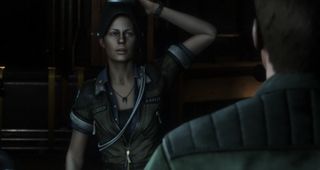
This game was reviewed on PS4.
More info
| Genre | Survival Horror |
| Description | Total War developer Creative Assembly goes all-out to give the Alien franchise the brutal, claustrophobic, ungodly terrifying survival-horror adaptation it deserves. |
| Platform | "PS4","Xbox 360","PS3","PC","Xbox One" |
| US censor rating | "Mature","Mature","Mature","Mature","Mature" |
| UK censor rating | "","","","","" |
| Release date | 1 January 1970 (US), 1 January 1970 (UK) |


